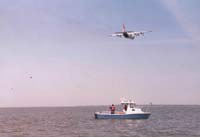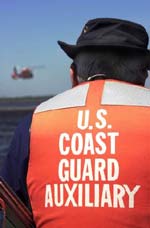"Boating
Season" - "Sailing Season"
Let's make sure it's a safe one!
By Wayne Spivak
National Press Corps
United States Coast Guard Auxiliary
Special thanks goes to Stanely
J Krol, USCG Auxiliary for
his article "The Boating Season is here" which is the
basis for this article.
"Duck Season!"
"No, it's Rabbit Season!" "Duck Season!"…
On and on, up and back, those crazy
cartoon characters Bugs Bunny and Daffy Duck would yell at poor
Elmer Fudd, trying to both confuse him and save their own hides.
Ultimately, poor old Elmer would end up shooting both of them,
after being shot himself. A very dangerous game, but fortunately
it's only a cartoon.
But it's really the boating season
again and the United States Coast Guard Auxiliary is busy patrolling
your local waters in support of the Coast Guard's recreational
boating safety mission. We want your boating season to be not
only fun but safe as well.
On a recent Sunday one of our patrols
came upon a 12 foot JON boat with one adult and two youngsters
aboard. Their motor would not start. All those aboard this small
JON boat were paddling frantically into the wind and waves.
 COAST GUARD AUXLIARY: CHARLESTON, S.C. (April 19, 2003)--The
Coast Guard Auxiliary extends the eyes and ears of the Coast
Guard. Coast Guard Chief Petty Officer Dave Borg (L) and
17th Coast Guard District Auxiliary Commodore Mike Folkerts
test drive two new watercraft (PWC) near North Douglas boat
launch. The Coast Guard Auxiliary working in Whittierand
here are using the crafts for search and rescue. An auxiliary
rescue crew aboard PWC's aided boaters in distress and towed
their large vessel to safety during the Memorial Day weekend
in Whittier. The PWCs are part of a new program coordinated
by Folkerts. USCG photo by PAC Roger Wetherell
COAST GUARD AUXLIARY: CHARLESTON, S.C. (April 19, 2003)--The
Coast Guard Auxiliary extends the eyes and ears of the Coast
Guard. Coast Guard Chief Petty Officer Dave Borg (L) and
17th Coast Guard District Auxiliary Commodore Mike Folkerts
test drive two new watercraft (PWC) near North Douglas boat
launch. The Coast Guard Auxiliary working in Whittierand
here are using the crafts for search and rescue. An auxiliary
rescue crew aboard PWC's aided boaters in distress and towed
their large vessel to safety during the Memorial Day weekend
in Whittier. The PWCs are part of a new program coordinated
by Folkerts. USCG photo by PAC Roger Wetherell |
JON boats are flat bottom boats
used in areas where the water is calm. The distance between the
water line and the gunnels (the upper edge of a boats side), called
freeboard, is normally about 18 inches. When the patrol boat came
along side, they estimated a mere six inches of freeboard.
This lack of freeboard was caused
by over loading the boat (too much weight), and could have caused
the boat to capsize if the wave heights had increased any more
due to higher winds. Lesson here: Never exceed the weight capacity
of your boat!
While towing this boat back to
shore, one of the members of the Auxiliary patrol recounted how
an incident the year prior, in the same area, could have easily
turned into a fatal accident.
That incident involved a Personal
Water Craft (PWC) and some swimmers. When the Auxiliary patrol
boat approached the PWC, which was dead in the water, and asked
if he had a problem and did he need help, the answer was astounding.
The PWC operator informed us that he lost his key overboard and
that the swimmers were trying to find it.
 C-130
DROPPING SUPPLIES TO AUXILIARY BOAT: CURRITUCK SOUND, North
Carolina (June 27)--A Coast Guard C-130 aircraft drops supplies
to waiting Coast Guard Auxiliary craft. Bud Greene C-130
DROPPING SUPPLIES TO AUXILIARY BOAT: CURRITUCK SOUND, North
Carolina (June 27)--A Coast Guard C-130 aircraft drops supplies
to waiting Coast Guard Auxiliary craft. Bud Greene |
As our Auxiliarist recounted, as
they were approaching the PWC, no one remembered seeing any swimmers
- so they immediately asked, what swimmers?
The PWC operator pointed to two
young ladies treading water about 50 feet away. Just as he said
this, a large high speed power boat came roaring between the PWC,
the Auxiliary patrol boat with our safety light flashing and the
swimmers. Needless to say, a very close call for the swimmers,
and one they were not soon to forget.
Lesson here: Use a lookout when
underway (it's required by federal law) and as swimmers, don't
swim in areas where powerboats transverse. In other words, use
some common sense!
Fortunately for this Auxiliary
patrol, everyone returned home safe and sound, and hopefully a
little wiser. The water is fun, water sports are a great past-time,
but the sea is also unforgiving.
 COAST
GUARD AUXLIARY CHARLESTON, S.C. (April 19, 2003)--The Coast
Guard Auxiliary extends the eyes and ears of the Coast Guard.
Auxiliarist George O'Brien keeps a watchful eye on the harbor
while a HH-65 helicopter drills with rescue swimmers in Charleston
Harbor, Charleston, S.C. USCG photo by PA3 Beth Reynolds COAST
GUARD AUXLIARY CHARLESTON, S.C. (April 19, 2003)--The Coast
Guard Auxiliary extends the eyes and ears of the Coast Guard.
Auxiliarist George O'Brien keeps a watchful eye on the harbor
while a HH-65 helicopter drills with rescue swimmers in Charleston
Harbor, Charleston, S.C. USCG photo by PA3 Beth Reynolds |
So the best way to participate
in water activities, especially recreational boating, is to acquire
knowledge, knowledge about the rules of the road, about navigation,
about weather and knowledge about the area in which you are boating,
commonly referred to as called local knowledge.
The Coast Guard Auxiliary can help
you obtain the knowledge you require to boat safely though our
many different safe boating classes and navigation courses. Those
of you who want to assist both your fellow boaters and the Coast
Guard by joining the Auxiliary can continue your education, taking
many of the same courses the active duty Coast Guard provides
to their enlisted and officer corps.
For more information, contact your
local Coast Guard unit located in the phone book or on the web
at https://www.uscg.mil or the
Coast Guard Auxiliary, located on the web at
https://www.cgaux.org.

RUNAWAY
TRAIN FIRE: ROCHESTER, New York (Dec. 23)--A 47-foot motor
lifeboat and 55-foot Auxiliary boat from Station Rochester
respond to a fire from a runaway train that exploded with
three tank cars and 42 other cars on the edge of the Genesee
River today. USCG Auxiliary photo by George R. Taylor
|
|

